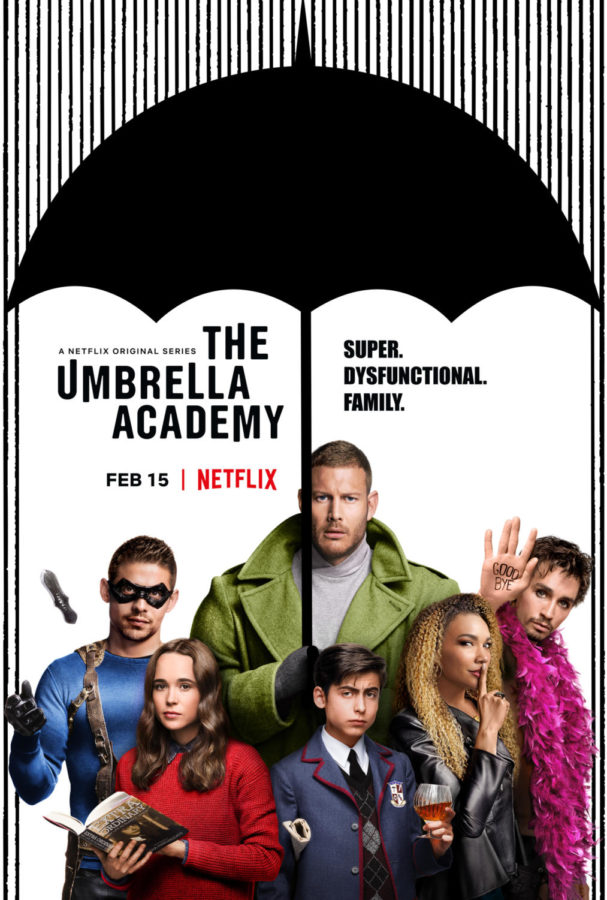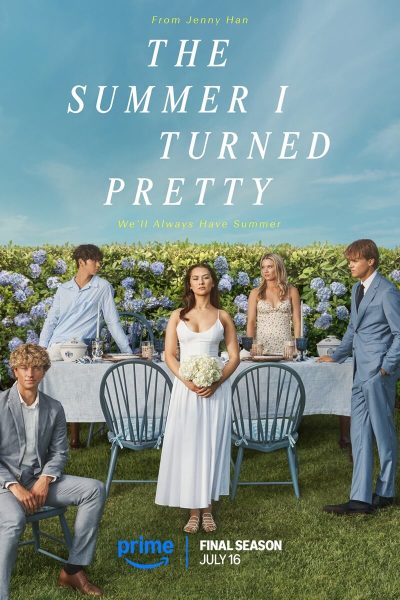Netflix original “The Umbrella Academy” thrills audience with raw feeling
We’re all familiar with the Marvel and DC worlds, the tropes they follow and we know with each new movie released what to generally expect. Right now, these are the two comic book universes that are dominating the motion picture industry, so it was only natural that when I first saw the series “The Umbrella Academy,” I assumed that it was based on some tiny Marvel comic that I had never heard of.
Because I’ve never really been a fan of Marvel movies or shows, I was very skeptical as to how good it could be because of this assumption, even after watching the whole trailer and admitting that it actually didn’t look awful. Nevertheless, I begrudgingly agreed to at least try it out and watch the first episode with my dad, who had a lot more faith in it than I did. But within the first 10 minutes, I was hooked.
“The Umbrella Academy” follows the lives of seven siblings, born in the same moment in different parts of the world, as they come together after the death of their adopted billionaire father Sir Reginald Hargreeves. Each of the siblings are numbered, differentiated by their innate powers that make them The Umbrella Academy. That is, all except one.
Number Seven — also known as Vanya — is the only “ordinary” sibling in the Hargreeves family, born with no powers like her brothers and sister. She is considered the main character of the show: a third chair violinist who struggles with feeling like she’s enough amidst a group of siblings of the extraordinary, a mother who’s essentially a robot and a talking British monkey of her father’s creation. After the siblings learn of their father’s passing, they gather together at the mansion they were raised in to attend his funeral. However, none of them haven’t spoken or seen each other for years, with one of the siblings dead and another one missing in some unknown time, and there are some heads that butt and personalities that clash. They attempt to solve the mystery behind their father’s death, but the hard feelings between them makes it difficult.
At his funeral, however, their missing sibling Number Five appears, in the same form he was when he went missing — a 13-year-old boy. Number Five has the power to travel between time and space, and went missing when he travelled into the future and could not find a way to return. He is the character that introduces the main plot of this season, as what he saw in the future was the apocalypse, meant to happen in 7 days.
It became quickly apparent to me that this show was about as far from Marvel as it could get. Yes, it has “superheros” in it and is based on a comic book (and even has the very typically bad writing that comes with comic book-based movies), but there is exactly nothing else about “The Umbrella Academy” that makes me think Marvel.
The biggest difference that sets it apart from Marvel — and even DC — is the maturity level. It’s not just the sheer amount of dark elements and themes, but it’s the way these things are handled and perceived. For example, each of the siblings has at least one thing in their past that causes them to grieve, and while in other superhero movies and TV shows these are usually powdered up and given a Hollywood spotlight in order to romanticize and make into an epiphany-worthy memory, these moments are much more raw in “The Umbrella Academy.” There’s a realness in these hardships that is not present in other superhero tropes, and in contrast to the far reaching that fans of Marvel have to go through to connect characters’ past to things like PTSD and pure trauma, these things are more than obvious just by looking at the flashback scenes themselves.
I think this is the reason I enjoy the characters of “The Umbrella Academy” so much. While I do like a lot of superhero characters like Deadpool, Black Panther, Batman and the Guardians of the Galaxy crew, I feel there’s an inability to truly connect with them , which comes from the Hollywood plasticity that covers them. This is not very present with the characters in “The Umbrella Academy,” and I find that the characters I like the most from the show also end up being favored over any Marvel or DC characters that I like.
The rawness of the show is presented in a number of ways even beyond the characters. The scenes in which characters die are so sudden that I at even one point made a comment about never seeing this in any other movies or TV shows, and I was shocked that there was really nothing else to the moment.
There were honestly very few things about this show that bothered me. For a comic book-based show, the writing was about as I expected, the acting was surprisingly very good in my opinion, and the pacing really didn’t bother me one bit. Even the soundtrack didn’t disappoint, with a mix of retro bops and a touch of some well-picked ballads.
I’m wholeheartedly looking forward to season 2 of “The Umbrella Academy,” where hopefully there will be more chances for me to fall even more in love with the unique story and characters.






